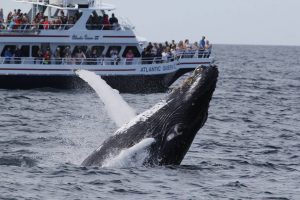
We partner with local whale watch businesses and charter boats to study whales and teach passengers about the incredible marine mammals in the Gulf of Maine. While aboard, we record sightings of all marine mammals (whales, dolphins, seals) and other species of interest, such as sharks, fish, and seabirds. We also collect digital images of the whales’ natural markings to identify and track individuals. We also record environmental data and the presence of human activities and other potential threats.
All of this data helps us maintain a catalog of local fin and humpback whales, monitor trends in their populations, inform resource managers, and participate in collaborative studies with other organizations.
Current Research Projects
- Identifying and cataloging local fin and humpback whales
- Studying the distribution and behavior of large whales in the Gulf of Maine
- Investigating long-term trends in distribution and social groups among marine mammals
- Documenting the presence of endangered species, like North Atlantic right whales, and any threats to whales (e.g., vessel strikes, harassment or entanglement/injuries) and reporting to proper authorities.
Why Study Whales?
Whales are an important species in the Gulf of Maine, and their health can reflect ocean health. The data we collect is unique and provides valuable information for policymakers that ensures the health of whales and the Gulf of Maine. Interested in getting involved? Check out our volunteer or internship program or attend one of our events!
Recent Research Reports and Presentations
2024 Research Report (summary coming soon!)
2023 Research Report | 2023 Research Summary | 2023 Research Summary Flipbook
2022 Research Summary | 2021 Research Report | 2020 Research Report and Summary
Presentations:
2023 Whale Research Season Highlights (virtual program, Winter 2024, linked below)
